|
ANOTHER OBA FIRST! |
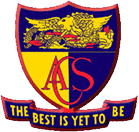 The
Inaugural ONE ACS Career Forum held at ACS (Independent) on 4 August was well attended by approximately 700 students, parents, alumni and staff of ACJC, ACS (Barker Road), ACS (Independent) and ACS (International). Hosted by the ACS OBA, the event was unique in that it was neither the usual admissions prep course for tertiary education nor was it a series of industry experts promoting their professions; it was in fact a forum to expose the participating students to the different perspectives of the Law, Banking, Education and Medicine professions in a candid and informal format, and to the different ways in which people make choices. The
Inaugural ONE ACS Career Forum held at ACS (Independent) on 4 August was well attended by approximately 700 students, parents, alumni and staff of ACJC, ACS (Barker Road), ACS (Independent) and ACS (International). Hosted by the ACS OBA, the event was unique in that it was neither the usual admissions prep course for tertiary education nor was it a series of industry experts promoting their professions; it was in fact a forum to expose the participating students to the different perspectives of the Law, Banking, Education and Medicine professions in a candid and informal format, and to the different ways in which people make choices.
The speakers were all-ACSians and the topics covered a diverse range of questions such as “Tell us about the Highs and Lows of your career” and “What a typical day in your profession is like?” It was indeed a fruitful forum which presented the participants with plenty of opportunities for questions and answers as well as personal interactions with industry leaders.
The Education Panel
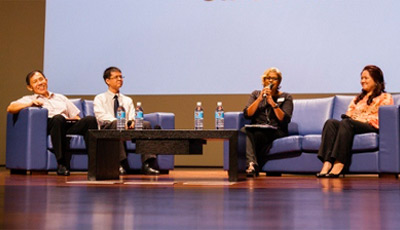 Moderated by
Geetha Creffield, Head of Arts at ACJC, the Education Panel comprised
Peter Tan, Principal of ACS (Barker),
Glynn Tan, former ACS (Independent) teacher and now a Special Projects Officer at the Ministry of Education’s Headquarters, and
Angela Ng, Year Head at the Methodist Girls’ School. Moderated by
Geetha Creffield, Head of Arts at ACJC, the Education Panel comprised
Peter Tan, Principal of ACS (Barker),
Glynn Tan, former ACS (Independent) teacher and now a Special Projects Officer at the Ministry of Education’s Headquarters, and
Angela Ng, Year Head at the Methodist Girls’ School.
The panellists agreed that they all had the passion for teaching and that student appreciation made all the difference to their job fulfilment. The newness of each situation, while challenging, brings diversity to a career in education and makes waking up each morning and going to school worth it.
When asked about the highs and lows of their careers, the panellists had much to say. Peter shared that one of the personal lows of his career continues to be the untimely passing of a student and that he grieves with each student’s family. Glynn spoke about the intellectual challenges of customising his lessons to students’ abilities, and how there is a constant need to make education more engaging in the current social-media enabled environment. Angela commented that teaching is far more than merely imparting knowledge; it is the personal connections that are made with students and the opportunity to influence and shape young lives. The added opportunities to attend courses either locally or overseas for skills upgrading also add to the constantly changing nature of teaching.
The Law Panel
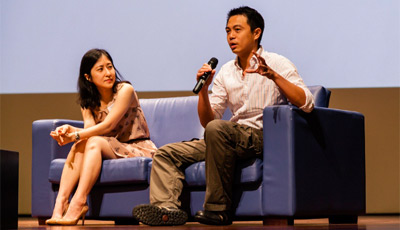 The Law Panel comprised
Jonathan Yuen (moderator) from Harry Elias Partnership,
Daniel Tan from Clifford Chance,
Kristy Tan from Allen & Gledhill and
Chan Yong Wei from Drew & Napier. Jonathan began with an overview of the diverse legal profession which included lawyers in private and public practice and academia. Within the public sector, he elaborated that there are lawyers who represent the government as state counsels, while others assist parliament to draft/amend laws, serve as judges in our legal system or are seconded to specific ministries. The Law Panel comprised
Jonathan Yuen (moderator) from Harry Elias Partnership,
Daniel Tan from Clifford Chance,
Kristy Tan from Allen & Gledhill and
Chan Yong Wei from Drew & Napier. Jonathan began with an overview of the diverse legal profession which included lawyers in private and public practice and academia. Within the public sector, he elaborated that there are lawyers who represent the government as state counsels, while others assist parliament to draft/amend laws, serve as judges in our legal system or are seconded to specific ministries.
Daniel added that within the private sector, apart from external counsels who work in law firms, there are also lawyers who work as in-house counsels within companies. Kristy summed up that the scope of work that lawyers perform is wide, ranging from transactions to litigation, and from family to highly specialised areas like telecommunications and shipping. Hence what they do on a typical day could range from reviewing documents, research and meeting with clients to preparing arguments, and court attendance to make arguments before judges. There are bad days when a case is lost or when clients change their minds after extensive preparations have been done. However, there are also good days when cases are won, deals are successfully concluded or when they were able to help a needy person - all these experiences are what keep them going.
As a lot of detailed work goes on in law, the panellists informed those considering the legal profession that they must be prepared to work punishing hours; they should also be comfortable dealing with conflict and have strong communication skills as the legal profession is a “people business”. Jonathan added that even if one does not stay a lawyer throughout his/her career, the study and practice of law will definitely create a strong foundation for a lawyer to successfully switch to other industries and businesses, although he qualified that the ease of transition will depend on whether there was a nexus between the lawyer’s current job scope and that which he/she intends to move into.
Finally, the panellists suggested that the best way to find out if law was a suitable career would be for the students to speak to their older friends, family members or relatives about their lives as lawyers. In addition, they should try to get internships with law firms to get a feel of the profession—and not to rely on impressions from TV or the media.
Banking & Finance Panel
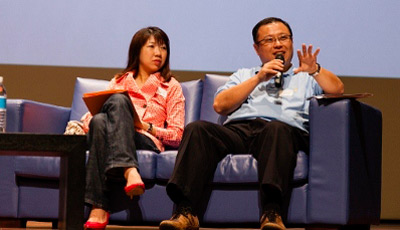 The Banking & Finance panellists were
En Lee (moderator), a Director at Impact Investment Exchange Asia (IIX),
Arthur Lang, Group Chief Financial Officer at CapitaLand,
Melissa Chen, Associate Director at Overseas-Chinese Banking Corporation (OCBC) and
Ong Tek Khoan, Managing Director at Templeton Asset Management. The Banking & Finance panellists were
En Lee (moderator), a Director at Impact Investment Exchange Asia (IIX),
Arthur Lang, Group Chief Financial Officer at CapitaLand,
Melissa Chen, Associate Director at Overseas-Chinese Banking Corporation (OCBC) and
Ong Tek Khoan, Managing Director at Templeton Asset Management.
En began by explaining that the very diverse nature of the finance industry often makes it difficult to navigate through the career opportunities available. As the panel was well-placed to provide valuable insights into the industry from the perspective of a commercial banker, an investment banker and an investment manager, each of them then shared their respective background and personal motivations for choosing a finance career.
En highlighted a key distinction for aspiring bankers to understand – the difference between a commercial bank and an investment bank. Melissa explained the role of commercial banks like OCBC in providing loans to small and medium enterprises (SMEs), the various products available and the process involved. Arthur, formerly an investment banker at Morgan Stanley, then contrasted this with the role of investment banks to advise and provide financial analysis on corporate transactions like mergers and acquisitions and initial public offerings (IPOs). Following this, Tek Khoan highlighted another key industry distinction - the difference between banking and investment management. He explained investment funds and his role at Templeton managing emerging market assets.
In terms of “best” moments in their respective roles, Arthur shared his excitement of working on a large investment banking transaction while Melissa liked the diversity of her job and Tek Khoan enjoyed being immersed with information in order to make investment decisions. Despite high levels of compensation, all panellists alluded to the long working hours, competitive culture and the unpredictable, cyclical nature of banking as the main challenges. Arthur recalled his “worst” moment when he had to make a team of bankers redundant during the financial crisis. Tek Khoan described a transaction which required him to fly to Africa and descend down one of the world’s deepest gold mines.
All panellists agreed that there were various routes to entry for finance careers. En mentioned that many lawyers and engineers had transitioned to finance careers. In terms of general advice in getting into the industry, the panellists stressed the importance of having strong technical and analytical ability (eg financial modelling skills), good interpersonal skills, learning new concepts quickly and having an open mind. Arthur added that it was important to draw a clear line between personal values and career as it may sometimes be tested in banking. Tek Khoan added that there were several courses like the Chartered Financial Analyst (CFA) programme that helped him transition into finance.
Before ending the session, En encouraged the audience to stay back for the networking session to interact with the panellists and other prominent industry leaders present in the audience, among them were
Dilhan Pillay, Head of Portfolio Management for Temasek and
Olivier Lim, Chief Investment Officer for CapitaLand.
Medicine Panel
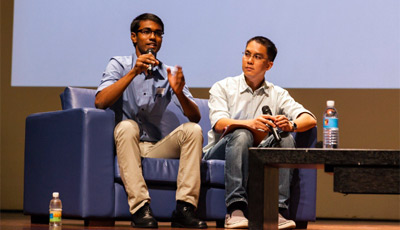 Dr David Tan, a Family Physician with the National Healthcare Group Polyclinics, chaired the Medicine panel which comprised
Dr Andrew Loy, an Ear, Nose and Throat-Head and Neck Surgeon in private practice at the Mt Elizabeth Medical Centre,
Dr Lim Hsien Jer, an Anaesthetist working in the National University Hospital and Parkway Hospitals, and
Mr V.N. Vikram, a current third year medical student from NUS YLLSOM. Dr David Tan, a Family Physician with the National Healthcare Group Polyclinics, chaired the Medicine panel which comprised
Dr Andrew Loy, an Ear, Nose and Throat-Head and Neck Surgeon in private practice at the Mt Elizabeth Medical Centre,
Dr Lim Hsien Jer, an Anaesthetist working in the National University Hospital and Parkway Hospitals, and
Mr V.N. Vikram, a current third year medical student from NUS YLLSOM.
Dr Tan began with an overview of healthcare in Singapore, covering the private and public sectors, as well as the different levels of medical practice from Primary Care to Tertiary/Specialised Care. Following that, the panellists expressed some of the reasons why they chose Medicine as a career, and the overarching theme was their desire to serve and care for patients; they also stressed that Medicine is hard work requiring a lot of studying and time commitment.
Dr Loy, who read Medicine overseas, felt that Medicine in Singapore tended to be more content-based with a lot more "mugging" involved, while Dr Lim, a mother of 3 boys, shared her experience on why starting a family for many doctors may sometimes have to take a backseat as one goes through the rigorousness of postgraduate training and studying for exam after exam. On a lighter note, Vikram also told the audience that medical school need not be all work and no play, and outlined the various activities that he has been involved in, ranging from community projects to drama and dance performances.
The panellists agreed that the medical profession can be most rewarding when they know that they have made a difference in their patients’ lives. However, there are occasions when they experience disappointments when their patients did not do well and passed on.
In closing, the panellists advised those thinking of reading medicine to find out more about life as a doctor by talking to seniors who have walked the path before them, or arranging job shadowing or internships. They then mingled with parents and students after the session to answer further questions on pre-requisites for the medical school, funding for needy students and options for post-graduate training.
From the feedback that the organisers received,
both students and parents found the candor of
the panelists to be both insightful and
thought-provoking. The ACS OBA would like to
thank the ONE ACS Planning Committee and the Old
Boys and Girls for all their time and effort and
most importantly, for rising to our call to
serve our ACS community.
|
|